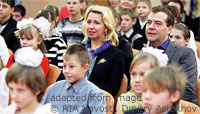Putin Declares War on Orphans, NGOs and the U.S.

(Bloomberg editorial – bloomberg.com – January 2, 2013)
On New Year’s Day, a law took effect in Russia banning U.S. families from adopting children there. Not only is this use of orphans to score a political point repugnant, it also reflects a worrying defensive and isolationist trend in President Vladimir Putin’s foreign and domestic policies.
The adoption ban was rushed through Russia’s parliament in obvious retaliation for a new U.S. law denying visas to and freezing assets of officials involved in the unpunished jailhouse death of Sergei Magnitsky, a Russian anti-corruption lawyer who represented a U.S. hedge fund.
The new law does nothing to hurt the U.S. officials at whom it was directed, while denying a better life to Russian orphans, who are statistically more likely to survive and thrive in the U.S.
In addition, the adoption law is less of an isolated tit- for-tat with the U.S. than it seems. The decision reflects a wider attempt by Russia’s political leaders to batten the hatches against foreign political influence, international cooperation and civil society within Russia. This penchant can also be seen in Russian efforts to block precedents that legitimize cross-border humanitarian intervention anywhere on the globe.
Such policies, with their insistence on sovereignty and noninterference, will be familiar to any student of the former Soviet Union. While they are rational for Putin in terms of protecting the political system he has created since coming to power in 2000, they bode ill for Russia in the longer term.
Potemkin Democracy
Pro-democracy nongovernmental groups, by definition, are hostile to Putin’s Potemkin democracy. Similarly, the Kremlin regime worries that a robust “responsibility to protect” principle to support internationally sanctioned military intervention against governments that abuse their populations might one day be used against Russia, or, more plausibly, its ex-Soviet neighbors such as Belarus, Uzbekistan or Ukraine.
Through the back-to-the-USSR policies of repression and isolation, Putin has neutralized domestic political opposition and blocked United Nations Security Council action on Syria. But as with the adoption law, the victims of which are Russian, these policies will probably prove self-destructive.
Take the conflict in Syria, where Russia has prevented any internationally sanctioned effort to intervene. That isn’t because Russia hopes to defend its particular interests in Syria — it knows those, and the regime of Bashar al-Assad, are lost.
Russia’s priorities are: First, to ensure that a Libya- style military intervention against established dictatorships does not receive further precedent; second, to ensure that even if Russia loses influence in the Middle East, the U.S. loses more.
Russia, as Syria’s only world-power ally, could help forge an end to the conflict. Doing so would give it a seat at the table in shaping Syria’s future, reduce turmoil in the Middle East (where jihadism poses a real threat to Russia), and appease Russia’s substantial Sunni Muslim minority. Yet Putin and Foreign Minister Sergei Lavrov prefer to stick by a crumbling status quo.
Lavrov could also help engineer the end of the international standoff over Iran’s suspected nuclear weapons program, which Russia has a strong interest in stopping. He could even help negotiate a package deal with Iran and Syria. Yet such efforts are unlikely so long as Putin is focused on solidifying iron rule and defying the U.S.
Conservative Base
Domestic examples of Russia’s defensiveness can be seen in the decisions to boot the U.S. Agency for International Development out of the country and to clamp down on foreign- financed nongovernment organizations. Russia’s burgeoning middle class and liberals may object, but in his second period as president, Putin’s power base centers on conservative, nationalist rural voters and the Russian Orthodox Church.
That’s a large base — and like Putin himself, the adoption law is fairly popular, supported by 56 percent of people polled in December. Many Russians see foreign adoptions of Russian children as a sign of weakness.
In the same way, the decision to prosecute members of the Pussy Riot punk performance group last year, for lip-syncing an anti-Putin song in an Orthodox cathedral, earned worldwide ridicule but pleased conservatives and the church.
Putin has tried to separate this political isolationism from the economy, where he understands that Russia must increasingly engage with the world. The country, for example, finally joined the World Trade Organization last year. But economics and politics can be hard to keep separate.
Hence the recent deterioration in relations between Putin and Germany’s Chancellor Angela Merkel. Germany was long Russia’s lead advocate within the European Union, which is the Russian petrostate’s most important export market for natural gas. Yet Putin has clashed publicly with Merkel over human rights during the past year, including over Pussy Riot.
With Germany no longer playing defense for Russia, the European Commission in September began an antitrust investigation into alleged monopolistic behavior by Russia’s gas giant, Gazprom (OGZPY) OAO, in eight of the EU’s eastern European markets. That could hurt.
Putin and his regime appear to be haunted by the experience of Mikhail Gorbachev’s glasnost, or openness policies, which in their view led to the breakup of the Soviet empire. Putin is determined not to repeat the error.
Yet Gorbachev was responding to years of missteps that made an increasingly isolated Soviet Union too weak to survive. Exactly the sorts of mistakes Putin is repeating now.
Article content ©2013 BLOOMBERG L.P. ALL RIGHTS RESERVED. Article also appeared at http://www.bloomberg.com/news/2013-01-02/putin-declares-war-on-orphans-ngos-and-the-u-s-.html
